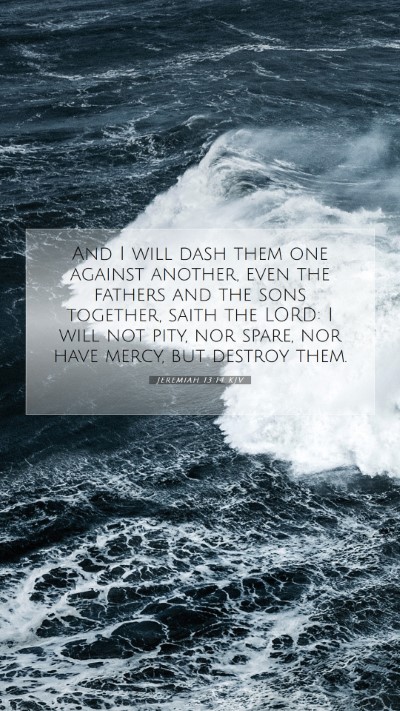Understanding Jeremiah 13:14
Jeremiah 13:14 states: "And I will dash them one against another, even the fathers and the sons together, saith the Lord: I will not pity, nor spare, nor have mercy, but destroy them." This verse encompasses profound themes of judgment, divine justice, and the stark reality of consequences for disobedience.
Overview of Biblical Context
The Book of Jeremiah addresses the impending judgment upon Judah due to their unfaithfulness to God. The imagery of dashing the fathers against the sons signifies the severe nature of God’s impending judgment - no relationship, even the closest, would offer shelter from divine wrath.
Insights from Public Domain Commentaries
Various commentaries shed light on the meaning of this verse:
- Matthew Henry: Highlights that this verse reflects the seriousness of God's wrath against sin. Henry emphasizes that familial bonds do not exempt individuals from divine judgment. God's justice demands accountability, which will fall indiscriminately upon the guilty.
- Albert Barnes: Adds that the metaphorical destruction signifies the complete overthrow of Judah's society. Barnes points out that this verse serves as a stark warning of the overwhelming consequences that arise from turning away from God and persisting in sin.
- Adam Clarke: Discusses the historical context of Jerusalem’s fall, stressing that such devastation was an inevitable result of the people's rebellion. Clarke's interpretation encourages a reflection on the importance of heeding divine warnings to avoid calamity.
Theological Implications
This verse raises several theological questions regarding the nature of God’s justice and mercy. While it underscores God's readiness to judge sin, it also indicates His overall purpose in guiding His people towards repentance and restoration.
Key Themes
- Divine Judgment: The verse emphasizes that God’s judgment is certain and inevitable, particularly for those who persistently disobey Him.
- Accountability: It reiterates the concept that individuals are responsible for their actions, and familial ties do not save one from judgment.
- God's Sovereignty: The assurance that God controls all aspects of consequence and retribution, indicating that His justice will prevail.
Application in Today's Context
For contemporary readers, the verse serves as a sobering reminder of the consequences of sin. It invites self-reflection on personal conduct in relation to God and encourages reliance on divine mercy available through sincere repentance.
Bible Study Insights
When conducting Bible study on this passage, consider the following:
- Discuss the nature of God as both just and merciful.
- Reflect on personal accountability versus collective responsibility.
- Explore the historical context of Jeremiah's prophecy and its implications for modern believers.
Cross References
To deepen understanding, consider the following cross-references:
- Deuteronomy 24:16 - Emphasizes individual accountability for sin.
- Ezekiel 18:30-32 - Calls for repentance and turning from sin.
- Romans 1:18-32 - Discusses God's wrath against unrighteousness.
Conclusion
Jeremiah 13:14 challenges readers to confront the reality of divine judgment while also holding forth the hope of redemption through repentance. This understanding highlights the importance of actively engaging with Scripture and seeking Bible verse meanings and Bible verse interpretations to apply its teachings to daily life.


